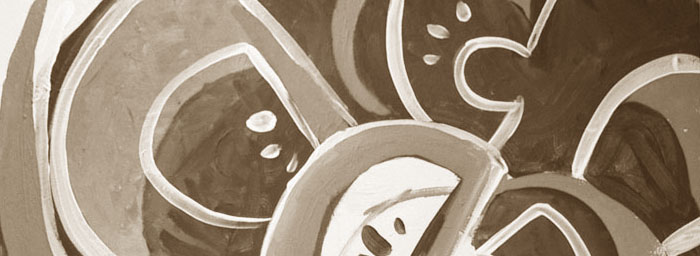Monkey Do.
[[seriously, watch as many videos from TED as possible, get a feel for what the intelligista are thinking about. then either think with them or against them, I figure it would be hard not to think at all]]
Thursday, July 10, 2008
Subscribe to:
Post Comments (Atom)

2 comments:
I dig it. I like the outward-spiral model of evolution he uses.
My main question though: technology's evolution is driven by life, no? And we also aren't diving the evolution of, say, fungi as directly as we are technology, right? We do not literally add extra limbs to spider monkeys or anything, so technology's inclusion as the seventh kingdom is fundamentally different.
(Though now that I think about it, as we make drugs that fight off disease, disease becomes more resilient. So maybe we do drive other kingdoms' evolution. But not as directly. Hmm.)
The thing here is the illusion of kingdoms alltogether.
One set of DNA is different from another set, sure, but no single set of DNA (say mammels, or Humans in particular, or some fungus or whatever) evolves independant of any other set. Isolation happens, but only to some finite degree (say penguins in the antarctic or plants on some desert island: they are still affected by single celled creatures in the ocean, and viruses and whatnot, which are in turn affected by everything else) and so it is possible to answer the question, "How many organisms are there on earth?" with a resounding, "One".
The great thing here is treating technology (from cell phones and computers to teddybears and carpet)as a part of that one organism. It is just as much a part of the living world as your hair and bones are. Or just as much as a bee hive is the skeleton of the super-organism that is the swarm.
We are moving slowly past the opposition between animate and inanimate. Evolution is a universal process, not one restricted to life, and the line between life and non-life is a fuzzy one. I may be alive, sure, and so are my organs, and then the cells that make them up, but are the parts that make up my cells alive? (Midochondria probably are, but the nucleus? The ribosomes? The membrane?) And then the parts that make up the parts, those surely arn't alive by any normal viewpoint, since they are just complex molocules.
This does not, by any means, make it impossible for us to draw a line somewhere, and say this is life, that is not, but it has become impossible to do so without recognizing that such a line is not inherent in the world. It is a human distinction, that we use to some end, and our drawing it changes the way we see things without changeing the things themselves. (That last bit may be debateable, but we'd be far afield of biology to go there.)
All of life's evolutio is driven, at least in part, by other life. And technology is beginning to be recursive, to affect its own evolution just as much as, if not more than, than the humans that built it in the first place. It has become a feedback loop, and as such becomes more and more independant, and worthy of its own kingdom. As we use technology to build and desing technology, our role becomes less and less central to its progress, which is mind-blowing to think about.
So. All of this is comming from a sort of mind-neutral perspective where intent and purpose and design are mostly ignored. It's a zoomed out view, with time sped up some. But it is a view. And a wonderous one at that.
Post a Comment